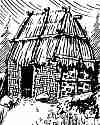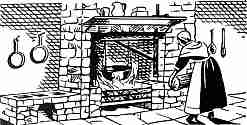 With this
background we can understand why they felt it a
privilege to build and live in huts of mud and thatch, to till the
ground with improvised tools, to hunt and fish for food and make almost
everything they used in their daily life with their own hands. After
they had passed through that first bitter winter, they planted their
crops in the spring. A busy summer followed and the harvest was good.
So, as fall came, it was natural for these people to set aside a day of
Thanksgiving. With this
background we can understand why they felt it a
privilege to build and live in huts of mud and thatch, to till the
ground with improvised tools, to hunt and fish for food and make almost
everything they used in their daily life with their own hands. After
they had passed through that first bitter winter, they planted their
crops in the spring. A busy summer followed and the harvest was good.
So, as fall came, it was natural for these people to set aside a day of
Thanksgiving.As the years passed, the Pilgrims were joined by hundreds of others - all kinds of people, educated and illiterate, gentlemen and peasants, artisans and scholars - all in search of freedom.  |








